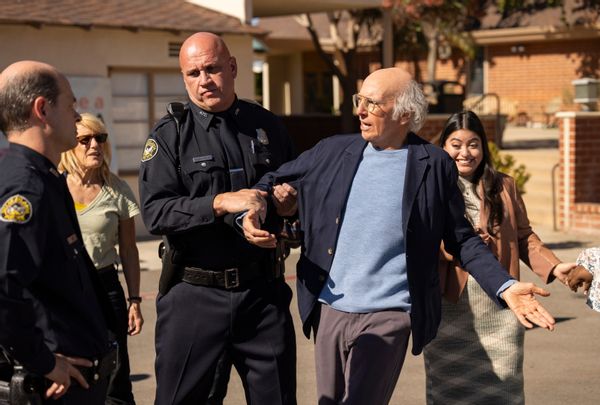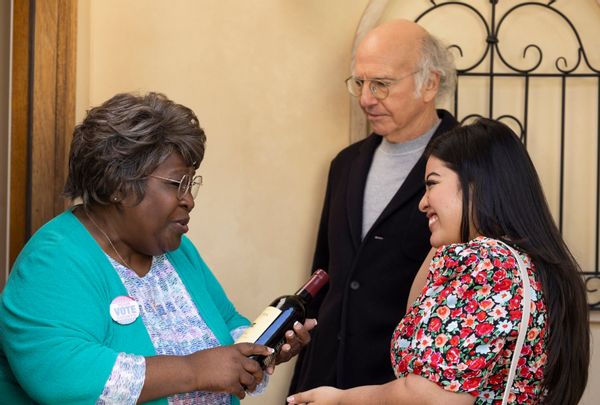
Can I admit something? I never liked Elmo. “Sesame Street” isn’t to blame for that. The fault lies with my mummified heart, I guess, along with the toy manufacturer that unleashed Tickle Me Elmo on the public in 1996. If you’re a Millennial or younger, maybe that doll was your best friend. We of the more crotchety generations, however, suffered through the plaything’s shrill, maniacal giggles for a sustained period – months, years maybe. Time itself quivered with the sound, that terrible, haunting chirping, adversely impacting our mental health forever.
So I completely get why Larry David would lay hands on the world’s kindliest Muppet on live TV. I never would, but David has made a career out of reminding the world that propriety is, eh, not really his thing. While his attack may have shocked the “Today” anchors, those of us who can never forget the late 20th century's Toy Troubles understood what he meant when he cried out, “Somebody had to do it!”
Twelve seasons and 23 years of “Curb Your Enthusiasm” have taught us to recognize how David arcs his jokes. The targeting system works something like this: He encounters something or someone that rubs him the wrong way. He wonders what obligates him to be deferential to this person or bow to the dictates of decorum that no one can justify.
Reflexive manners offend him. So do highly publicized acts of kindness – like, say, a sweet fictional three-and-a-half-year-old responding to a nationwide primal scream by reminding people he hears and loves them. And that is a beautiful sentiment.
David’s problem, I'm guessing, is that Elmo got higher billing than he did. That is a vaudevillian death sentence: as a rule, one never follows animal acts or children or child-like Muppets.
That morning he apologized to Elmo in the presence of Hoda, Al and the rest. But when he sat down on “Late Night with Seth Meyers” later, David's attitude waned many shades darker.
“Elmo was talking, OK?” David told Meyers. ”I was waiting to be interviewed, and Elmo was” – at this, David condescendingly assumed the puppet’s innocent soprano tone – “he's was going on about your mental health, and I had to listen to every word, and I was going, ‘Oh my god, oh my god, I don’t think I can take another second of this!’
“And so I got off my chair, and –" David resumed his normal speaking voice at this point, “I approached him and I throttled him! I couldn’t take it! And you know what? I would do it again!”
HBO and David didn’t bombard us with an elaborate promotional campaign leading to the 12th and supposedly final season premiere of "Curb Your Enthusiasm," but it’s tough to think of a better way to organically remind the public of what David and his show are about.
Not everyone thought the gag slayed. Wil Wheaton, for one, was horrified. "What the f**k is wrong with that guy? Elmo is, like, the best friend to multiple generations of children," Wheaton wrote in a Feb. 3 Facebook post. "In the Sesame Street universe, ELMO IS A CHILD, who is currently putting mental health and caring for others in the spotlight.
"And Larry F**king David . . . did . . . that? And thought it was going to be . . . funny?" he continued. "What? . . . What an a**hole. What a stupid, self-centered, tone deaf a**hole."
Just goes to show that humor is relative. David saw a bit and went for it. Elmo's puppet dad Louie, responded to the unprovoked assault semi-humorously while threatening to sue.
And our reactions to Elmo's wellness check-in and David's outburst are related. Elmo was genuinely being nice when he asked, “Elmo is just checking in! How is everybody doing?” Read some responses to his query and you may notice that several have a David-esque spite to them, as if to question the legitimacy of a puppet pretending to care, or recognizing that burdening a fictional innocent with nihilistic confessions about failing marriages and the world being on fire is, well, kinda hilarious.
Unless you suffer from PTSD, as Wheaton points out. "Like, read the room, d**khead," Wheaton says. "Elmo inspired a deeply meaningful and important moment of collective support among disparate people who have been struggling through the traumas of a pandemic, daily mass shootings, the rise of fascism and everything associated with Trump's violence and cruelty.
"And sh*tty idiot Larry David couldn't leave it alone, for some reason."
“Curb Your Enthusiasm” recently premiered its latest season, and the opening episode maintains David’s aggressive refusal to bow to the tyranny of maudlin sentiment. In a swift 30 minutes, he fat shames a corgi, makes a hotel housekeeper's final week a living hell and makes a man's party unpleasant. He also gets arrested for bringing water to someone waiting in line to vote. (The bulk of the episode's action takes place in Georgia.)
If you’ve always loved the show, David vs. Elmo probably won’t change that. But if you remember loving its first season before tiring of the star's repetitive schtick and wandering away, you may relate to these final misadventures, and David's offscreen antics, a bit differently.

Wheaton has a point in reminding people that kids were probably watching "Today" along with their parents. He also shared a personal story about his father abusing him by grabbing him by the shoulders and shaking him, which contextualizes his point of view. We should be more sensitive to the Elmo situation's optics.
David hasn’t changed much, understand. In the years since our initial introduction to his show, maybe we have.
“Curb Your Enthusiasm” isn’t uniformly brilliant. David’s 2017 return after a six-year absence was especially creaky. But the 11th season's pandemic response tapped a swollen vein of solipsism and antipathy running under our collective skin. We may nod at publicized sermons extolling kindness and advising consideration, agreeing that they are valuable virtues, but the reality is that many of us are at our limit.
Those same events Wheaton cite as negative impacts on our mental health also numbed many people to the point that the sight of an old guy taking out his frustrations on a Muppet was emotionally purgative.
Mind you, Wheaton is right. David is not a great man. The people who "TV Larry" crosses frequently remind him of how rich and privileged he is so that they and we know that nobody should feel sorry for the minuscule misfortunes he brings upon himself.
Why would we? The show's Larry is a curious combination of picky and compromising to a self-destructive degree. He’ll botch a gig over his annoyance at not being allowed to call a stranger by a pet name she reserves for her closest friends. And yet, he'll endure borderline disgusting intimacy with irritating, gassy councilwoman Irma Kostroski (a stunning Tracy Ullman) in the hope that she'll repeal a law requiring him to fence his pool.
TV Larry's misanthropy seemed heightened at the show's outset. Some 23 years later, along with a few financial crises and a long span of social distancing, many more of us find his confident antagonism validating rather than horrifying.
Alongside this feeling strolls the usual fears concerning relevance and our mortality, a pair of invisible monsters amply fed by the usual panic that accompanies a generational changing of the guard.
“Hark, the Millennial Death Wail” cried a recent New York Times headline written by a 39-year-old writer who adorably admits under his byline that “sometimes he feels really old,” and realizes on behalf of his generation that the passage of time is a real thing that impacts all of us. Like, really real you guys.
Forgive the mocking tone, which is the product of witnessing Larry and his permanent squatter Leon (J.B. Smoove) putting up with Maria Sofia Estrada, Keyla Monterroso Mejia’s character who is a hilariously untalented actor. She's part of Gen Z, the folks who never knew a world without Elmo, the ones nipping at Millennial heels and chipping away at their relevance. Gen Xers can relate, having writhed through that angst years ago before realizing how much better it is to resume not caring anymore.

In “Curb” Mejia is David’s foil, attracting the attention that his character both believes he deserves and finds repulsive. Leon, Larry’s loyal Xer buddy, thinks she’s doing too much too but, again, doesn't care as long as he gets his cake.
Larry’s inevitable offenses regularly require him to explain himself and his ridiculously twisted view of the world. When asked to define what the word "cordial" means, he responds, ”It means to be polite, to be friendly, and not to tell people what you really think of them, and what a**holes they are – yes, that’s cordial!”
Agreed. Does this explain why mustering the will to be out in public for sustained periods of time can require days' worth of internal pep talks? Or why so many folks brushed off Wheaton's outrage at a viral moment played broadly for laughs? Our numbness is a society-wide problem, and it's driving too many of us online to fester, accepting the illusion of community over in-the-flesh togetherness and the consideration that requires.
That makes the attitude of David's fictional self somewhat heroic. TV Larry refuses to be a hermit, bravely choose to inflict himself on strangers come what may. As he explains at one point, while he despises people individually, he loves mankind.
“I’ve been expecting more from myself for my whole life,” he admits to the person he most recently offended, “and it’s just not there.” That, my friends, is knowing thyself. Long after "Curb Your Enthusiasm" ends, we will never stop picturing David wondering why the world doesn’t see things his way. As we journey into its swan-song season, though, many more of us do. If we don’t, we will — given enough time, irritations, and the wrong figure asking us how we’re doing at the right moment.
New episodes of "Curb Your Enthusiasm" air at 10 p.m. Sundays on HBO and stream on Max.







